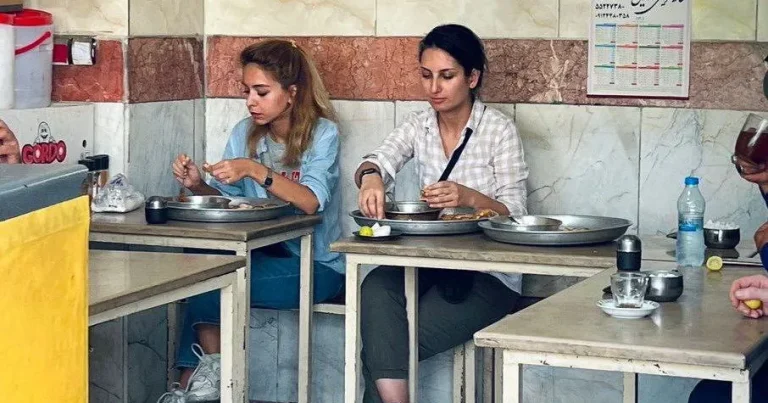
By Haleh Mirmiri
How do places become political? How does a coffeehouse, which was yesterday’s apolitical location, become a place to intimidate the ruling class? What must happen to arrest someone for eating breakfast in a coffeehouse? Locations might not be political spaces at some point, yet would become so when ‘power relations’ are materialized there. They are sites in which the subjects-bodies confront the power relations, intervening in the existing political order and interrupting the hegemonic governing techniques. Simultaneously, these localities are germane to temporalities. They are spots to remember what has happened in the past and think about what will happen in the future.
Coffeehouses are one of these places. They are one of the places in Iran where the politics between gender identities and power structures are felt, materialized, negotiated, and confronted. Coffeehouses have always been masculine spaces in Iran; although women often negotiated to enter in the past few years secretly, they have been objectively forbidden from being there. It has been said that “coffeehouses have always had a masculine connotation and women’s presence in it is not culturally acceptable” as they might draw male attention. Some women during the Qajar era [for example] disguised themselves as men or paid bribes to government officials and the city police to pass there secretly. The rule governing women’s entry to coffeehouses has not changed dramatically over the decades. Yet, some political patrons can alter this fundamental rule, politicizing the place just with their calm entry. This presence promises a new imagination, a radical one, to reframe another time and space.
Donya Rad was one of those patrons who started imagining an alternative “tomorrow.” A woman who entered a coffeehouse posted a snapshot of her experience on Instagram in the first days of the Jina uprising(s). She wrote: “In the middle of a working day, we went to a coffeehouse in Javadieh (in southern Tehran), grabbed breakfast and came back.” Donya’s image, sitting with ease at Javadieh’s coffeehouse table, circulated abruptly and revived pieces of memory for many other women’s who had never entered there. The photo brought back women’s absent bodies in the coffeehouse, where they could sip their traditional tea and eat their tasty omelette with a ravenous appetite. More than eating breakfast, this photo was both knotted to women’s traumatic memories of the past and their framing of a “tomorrow” to come. Thus, it is questionable why such a presence threatens the patriarchal political authorities. What is so frightening in this photo that caused this woman to be arrested? We, as women, used to enter several other places without permission. However, releasing this photo amid a progressive uprising resonated with our power to reappropriate those territories stolen from us because of our gender. Donya took her baby steps. She didn’t bribe government officials to buy her presence; rather, she politicized the place through her ordinary presence. We will continue marching to possess other stolen places.
This new normalcy, her calm and pleasant appearance, was a timely reminder that showed our power to act ‘with’ not ‘to’ patriarchy in changing any oppressive rules. However, this calm and performative presence intimidated the ruling class, as they knew the affirmative power behind this act. It was a turning point for those Islamists concerned about whether women would ask to enter other places from now on. “They wouldn’t, Sir!!!” Donya, and we, would say. Donya’s snapshot was a game-changer for them. It stimulated women’s imagination, directing them toward envisaging their future(s). Undoubtedly, many women have eaten Donya’s omelette and sipped her tea just by watching her photo, beaming at their victory a day after their revolution. They delightfully celebrate the collective resistance to enter coffeehouses and many other places. After posting the photo on Instagram, Donya was arrested and sent to the 209 ward of Evin’s prison for three weeks. Yet, it reminded us how to reterritorialize our stolen territories, memories, and imagination. This omelette taste will linger in our mouths for so long.